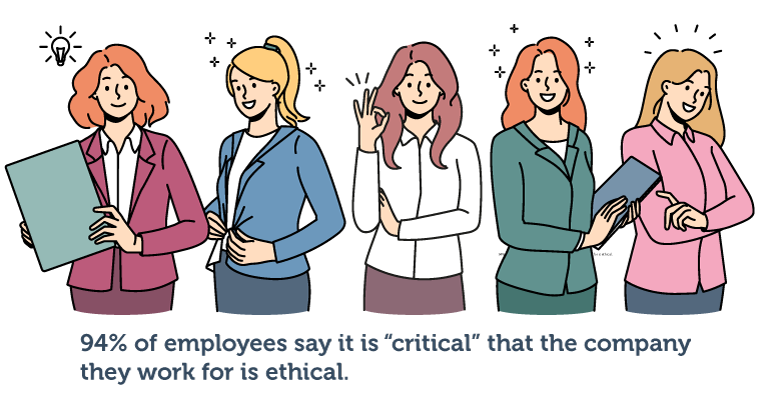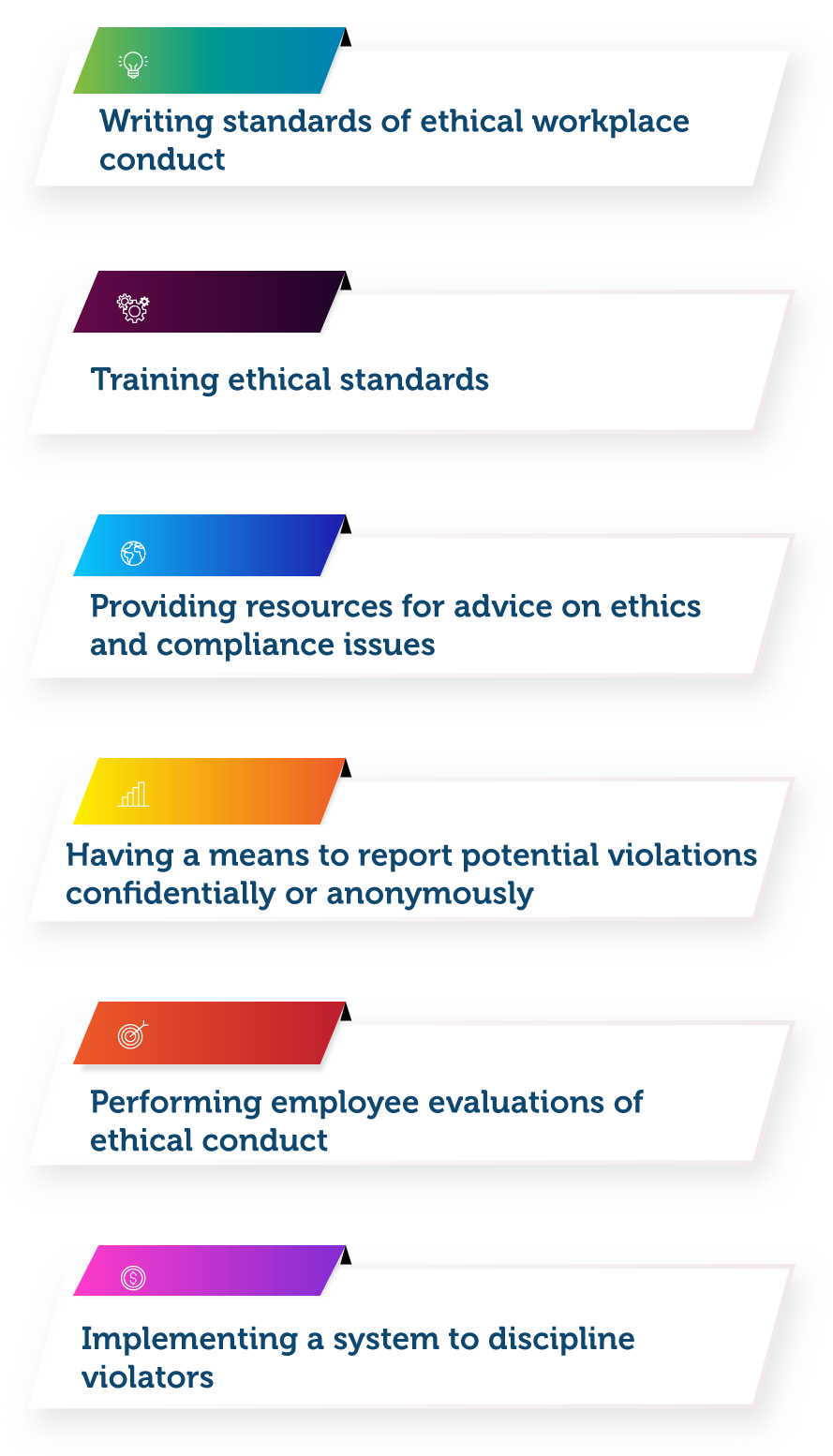
The Millennial Manager: Consider Hiring Millennials for Your Executive Team
How are Millennials transforming the workforce and companies’ cultures, and what does that change mean for the future of work? What makes this generation good leaders?


Author of The Career Toolkit & Creator of the Brain Bump

Founder & Group CEO of Image Group International

Digital Marketing Manager of Explainerd

CEO and Founder of Breadnbeyond

Co-Founder of Milkwhale

PR & Branding Manager at SBO

CEO & Founder of Home Healthcare Shoppe

Founder & CEO of Cicinia

CEO of PalaLeather
As businesses embrace new agile transformations, leaders must be equipped to manage ethics and compliance risks in our fast-paced and fluid environment.
But what does “doing the right thing” mean in the business context?
Business decisions are not always black and white. Moreover, in a highly competitive, profit-centric environment, ethics in the workplace are not very high on leaders’ agendas.
How can businesses commit to doing the right thing across all their business operations and still drive sustainable growth?
Combined with a mix of thought-provoking insights from top business leaders, this article explores what this higher standard of ethical behavior means for companies in an era where corporate behavior is more visible than ever.
In our rapidly changing business environment, the values and integrity of businesses are continuously tested. All of us make countless daily decisions at work, which may have far-reaching legal, financial, and social implications. Thus, companies must establish a clear moral compass – business ethics – to guide employees on how to always act with complete integrity.
So, what is workplace ethics?
Workplace ethics – often called business ethics – are the set of moral principles, values, and standards that both employees and employers follow in the workplace. At its core, ethics in the workplace is the moral code that guides employees concerning what is wrong and right conduct.
It is also important to note that there is a clear distinction between what is the law and what is ethical. Even if a company operates within the applicable laws and regulations, its actions may still be considered unethical.
“Most people think about ethics from a black-and-white standpoint: stealing office supplies or outright lying to customers. Ethics is much more subtle and more important in our daily work,” explains Mark A. Herschberg, author of The Career Toolkit & creator of the Brain Bump.
Herschberg adds, “How often has something been oversold? Sometimes it’s the salesperson distracting the would-be customer from a potential shortcoming that would significantly decrease the product’s usefulness.
Other times it’s a coworker pitching a project and underselling the risk involved because it makes him look good, and he knows he’ll be promoted long before the project falls apart 24 months from now (it’ll be his successor’s fault, anyway).”

Most people want to be proud of the company they are working for, and included in this is a belief that the business is ethical. In fact, whether a company acts ethically is a crucial factor in the average American’s willingness to work for an employer. One survey showed that 94% of employees say it is “critical” that the company they work for is ethical.
Ethics is such an important factor that 82% of employees would prefer to be paid less to work for a company with ethical business practices than to be paid more but work for one with questionable methods.
And yet, dominating the headlines these last couple of years are controversies and lapses in behavioral ethics by businesses in various industries.
“We are living in the least trusted times in recent memory,” says Founder and Group CEO of Image Group International, Jon Michail.
An increase in skepticism combined with anxiety driven by economic instability means that today businesses are operating in an environment where behavior that is perceived as unethical can generate a storm of public criticism.
Michail notes, “Trust has gone down dramatically (online and offline) and how you re-calibrate this trend to a positive is by bringing in solid ethical criteria that are reinforced by workplace behaviors that are strictly adhered to.
You can’t be half pregnant on ethics – you need solid ethical procedures to empower the workplace for the common good. A great ethical plan will create a win-win for all stakeholders.”
So, why are ethics important in the workplace?
Because the message is loud and clear: The world is changing, and with these new shifting expectations, there is no room for excuses for unethical behavior. As a result, corporate social responsibility policies and ESG frameworks have gained traction in the corporate world as organizations commit to sustainable and inclusive growth.

Last year’s “Ethics at Work” study by the Institute of Business Ethics showed that, on average, 20% of employees were aware of unethical or illegal misconduct at work. While most of those incidents are not major, ethical negligence tends to snowball. Once other employees see no repercussions to misconduct, they may also start acting unethically.
A company culture where such violations of ethics are tolerated – or even encouraged – risks public relationс scandals, operational distractions, financial liabilities, and even total collapse.
On the other hand, companies that build and maintain ethical workplace cultures have more motivated and productive employees, therefore more financially successful. Natasha Rei, Digital Marketing Manager of Explainerd, says that there are a variety of reasons why ethics in the workplace are important.
Rei explains: “First and foremost, they promote a positive work environment. By establishing clear guidelines for behavior, ethics help create an atmosphere of trust and respect.
This, in turn, leads to greater job satisfaction and productivity. Additionally, ethical practices help protect both employees and employers from potential legal problems.”
“Doing the right thing” can’t be set in stone as it is relative and situational. Social values and the public’s perspective are constantly shifting, meaning organizational behavior must also adapt to these changing times.
However, specific indicators and traits signal if a workplace has strong or poor ethics.
|
Strong Workplace Ethics |
Bad Workplace Ethics |
|
Honesty |
Lack of fairness |
|
Professionalism |
Excessive conflict |
|
Dedication |
Closed management doors |
|
Dependability |
Nepotism |
|
Integrity |
Gossiping |
|
Inherent Values |
Harassment |
|
Accountability |
Only thinking of what’s best for the bottom line |
|
Obeying company rules |
Lack of communication |
Andre Oentoro, CEO and Founder of Breadnbeyond, describes how strong and bad ethics affect the workplace.
Oentoro comments, “Ethics in the workplace is key to a positive work environment and fosters a culture of trust and respect. Employees who feel they can trust their employers and colleagues are more likely to be productive and motivated.
A strong ethical culture can also help prevent and resolve workplace conflict.
Meanwhile, unethical behavior in the workplace can lead to lower morale, higher levels of stress and anxiety, and even depression. It can also lead to decreased productivity, absenteeism, and turnover.”
A company may choose to define a general set of rules and regulations in writing. Still, employees face individual ethical decision-making daily, where they may struggle. It is not enough to simply publish a company handbook in the hope of introducing the behaviors an organization strives for.
Ethics in the workplace needs to be aligned across three different behaviors:
Without a doubt, the role of workplace ethics is significant to organizational success, and the only way to embed ethics in everyday life is by constant reinforcement across all levels.
A company’s values and core purpose must be simple to understand and explicit to build an ethical culture. The values of a workplace are a “compass” that employees can use to navigate a complex moral maze toward the right solution in any situation.
“It’s important to think carefully about the values and principles the company wants to promote and to model them throughout the company, starting from the top,” says Mario Cacciottolo, PR & Branding Manager at SBO.
Cacciottolo adds, “Some essential ethics to consider include integrity, discipline, honesty, respect, and accountability.
It’s also helpful to consider how to implement choices that reflect chosen ethics. Recognizing and rewarding behavior which upholds company values is crucial. It’s beneficial to have a proactive rather than reactive approach to this. Actively seeking and praising positive behaviors boosts morale and lets employees know their contributions are valued.”

What if you suspect laws and regulations have been breached in your workplace? Well, it doesn’t simply mean your company has a problem with following rules-based compliance, but also deteriorating ethics. If laws have been broken, ethical behavior will inevitably have been breached too.
Indeed, most employees would not choose to willingly and knowingly break the law. That being said, compliance failure happens when employees lack knowledge and understanding of the laws. Ethical behavior is the foundation and leads to regulatory compliance.
There are different types of HR compliance data metrics to keep track of:
Professionalism and ethics go hand in hand, as professional standards are a significant component of ethics. Appropriate language, etiquette, punctuality, time workload management, and working productively with others make up professional standards.
Developing good working relationships with other team members, customers, and stakeholders fosters a positive work environment and boosts employee morale. Acting responsibly with the interests of the greater community and business organization in mind is part of good ethical and professional behavior.
Research shows that an organization’s most influential ethical role model is a worker’s immediate supervisor. The ethical behavior of top leadership is essential to shaping how people behave at all levels of the workplace.
Rohit Bimbra, CEO/Founder of HomeHealthcareShoppe, says there are a few key ways to maintain work ethics. Bimbra lists the following:
“By following these tips, you can help create an ethical workplace environment.”
Other examples of ethics in the workplace include:

The upside of this heightened scrutiny of the integrity of business conduct is that it creates a culture in which employees are recognized and rewarded for doing the right thing, therefore building trust in the organization.
Caitlyn Parish, Founder & CEO of Cicinia, considers ethics in the workplace extremely important and the foundation of a business and its success.
Parish says, “Without ethical behavior, you’ll never be able to build a company that can last over time. Ethics are also critical because they help businesses attract top talent. When candidates know that they’ll be working with ethical and honest people, they will be more likely to join your team.
In addition to these benefits, ethical behavior helps companies avoid legal issues that arise from poor decision-making or behavior. By staying within the law, you can avoid fines and other penalties that could seriously damage your business’s bottom line.”
Ebnu Sudarso, Co-Founder of Milkwhale, shared the same sentiment and highlighted how ethics could affect employee wellbeing. Sudarso explains, “Ethics in the workplace is extremely important because good ethics promote higher productivity and wellbeing in the employees.
When the employees are happy and treated well, a business will thrive.
Having clear guidelines and rules for the employees’ safety and wellbeing will help promote a healthy working atmosphere, which is an excellent investment for the business in the long run.”
Undoubtedly, the benefits of ethics in the workplace are tremendous. When organizations hold themselves to high ethical standards, it boosts employee job satisfaction and productivity, resulting in company growth.
Conflicts, complaints, misconduct, and work-related accidents are inevitable in the workplace. Today, the workplace comprises five generations – all with different definitions of work ethics. Older generations criticize younger generations for their lack of work ethic since they equate a strong work ethic to being with the company for an extended period and being physically present at the office.
In contrast, younger generations see work ethic as autonomously working hard and contributing to the company while also establishing a healthy work-life balance.
The best way to address ethical issues in the workplace is by:
Mario Cacciottolo says it’s also important to use ethics to inform policies and processes.
“Allowing for accountability in a fair, reasonable, and respectful way will uphold company ethics and ensure they are maintained even if someone makes a mistake. Fostering a culture of fairness, inclusion, and support will facilitate everyone to flourish.”

Ethical dilemmas happen when something goes against our personal ethics, morals, and values. Examples of ethical dilemmas at work are reporting a close colleague for unprofessional behavior, taking credit for someone else’s work, stealing office supplies, or inappropriate employee behavior at work.
Almost all employees will face an ethical dilemma at some point in their careers. It could be something their coworker or manager is doing or something they are doing themselves.
Consequently, this means that business owners and managers will also have to deal with resolving these dilemmas and conflict management. Before taking any drastic action, employers must investigate comprehensively and hear all sides of the story. Moreover, employers need to alleviate fears of retaliation for those who witness misconduct and raise the issues.
Luke Lee, CEO of PalaLeather, explains that workplace ethics are important for several reasons.
Lee comments, “First, they promote a positive work environment. Employees who feel they can trust their colleagues and supervisors are more likely to be productive and comfortable voicing concerns.
Second, workplace ethics help to ensure that employees are treated fairly. This includes being paid a fair wage, having access to safe working conditions, and being treated with respect.
Finally, workplace ethics can help to prevent discrimination and harassment in the workplace. By creating an ethical workplace, employers can help to create a more positive and respectful work environment for all employees.”
To promote ethics in the workplace, first, you must define it. Having ethics codes that are understandable and frequently updated with input from “people on the ground” is one way of establishing a good foundation for expected ethical behaviors.
Aside from that, employers have several ways how to promote ethics in the workplace:
Companies must not wait for a problem to arise to promote ethical behavior. Instead, they should ensure employees, HR professionals, managers, and senior management understand possible ethical and compliance issues.
Ethics training, corporate compliance programs, and other education programs must teach employees how to recognize problematic situations and prevent any ethical lapses. Even more important than identifying these potential business scenarios is to create mechanisms to detect, respond and correct any ethical lapses in timely ways.
Rather than sweeping problems under the carpet, it is crucial to address and admit any instances of wrongdoing and correct them. Education only strengthens a company’s ability to foster a strong ethical culture and prepares employees for real-world ethical decision-making.
Unethical behavior in the workplace by even one employee can have a domino effect and spread throughout the organization. Leaders must equip, empower, and enable the workforce to get a deeper understanding of ethics in the workplace if they want to ensure organizational success.
Browse our curated list of vendors to find the best solution for your needs.
Subscribe to our newsletter for the latest trends, expert tips, and workplace insights!

How are Millennials transforming the workforce and companies’ cultures, and what does that change mean for the future of work? What makes this generation good leaders?

Favoritism in the workplace often operates quietly, shaping decisions and relationships in ways that can undermine fairness and trust. How can companies address this challenge before it creates a toxic workplace and stunts organizational growth?

From pioneering attempts to break systematic barriers to modern strides in gender equality, uncover the inspiring history of women’s contributions to the professional world.

Gain vital time and attendance insights to manage workforce punctuality and productivity effectively.
Used by most of the top employee benefits consultants in the US, Shortlister is where you can find, research and select HR and benefits vendors for your clients.
Shortlister helps you reach your ideal prospects. Claim your free account to control your message and receive employer, consultant and health plan leads.